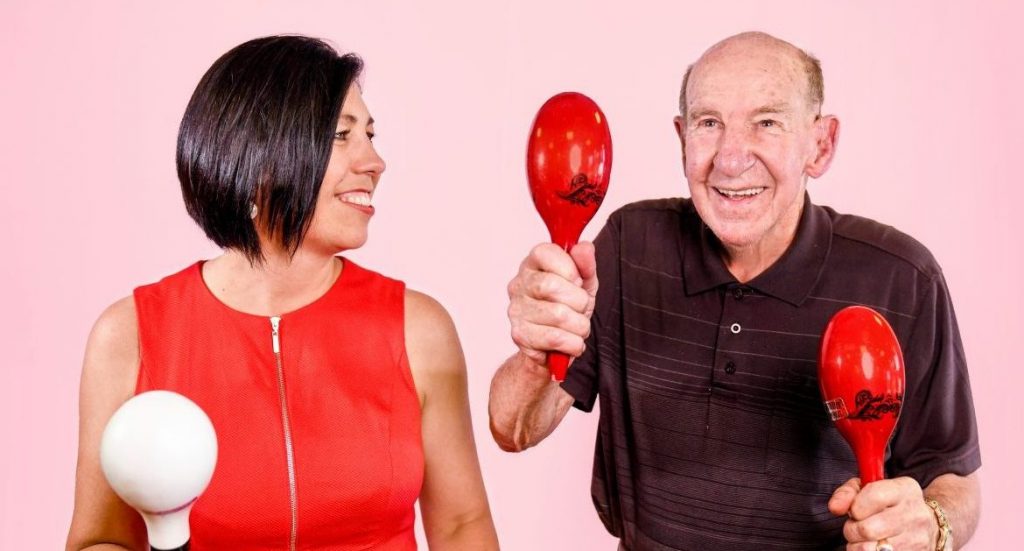Felicity Baker on Music Interventions for Dementia and Depression

Professor Felicity Baker is Head of Music Therapy at the Melbourne Conservatorium. She talks here about her upcoming symposium, Music Interventions for Dementia & Depression in Elderly Care.
Hi Felicity, can you tell us a bit about your career at the moment?
I recently took on the role of Head of Music Therapy at the Melbourne Conservatorium. In a world where funding in healthcare is increasingly tight, there’s a need to perform research that will secure work for clinicians but also, importantly, provide much-needed services for Australia’s most vulnerable people.
The numbers of people living with dementia are increasing and there’s an urgent need to test interventions that can support them to live healthy and meaningful lives with an improved quality of life. My career is currently focused on leading studies that address this very important need.
Therapeutic songwriting has been a long-term interest of mine and I’m using this to support family carers with people living with dementia (together with my Music Therapy colleague Dr Imogen Clark).
I’m also involved in a study with stroke patients led by Professor David Copland at University of Queensland whereby a music therapist-tailored listening program will be tested for its effect on people’s language recovery immediately following stroke.
Can you tell us about the Music Interventions for Dementia & Depression in Elderly Care: Symposium you’re hosting in Melbourne on April 26?
The symposium will include a mix of music therapy, neuropsychology, psychology and neuroscience presenters who will provide snapshots of how music may assist people living with depression to experience a better quality of life. It will feature presentations from key national and international researchers in the field of music and dementia.
The symposium will also mark the launch of your NHMRC-funded project – Music therapy interventions for dementia: Cluster randomised control trial. What does that project involve and what are you hoping to achieve?
At the end of the symposium, I’ll speak about this NHMRC project and the contribution of our partners, BUPA, Bluecross, Royal Freemasons Homes and REGIS.
It’s a world-first study on the effects of music interventions on people with co-morbidity of depression and dementia and my talk about it at the symposium will give the general public a chance to see what an important and game-changing project we’re undertaking.
With approximately 500 participants involved in this study across 40 sites in Melbourne, Sydney and Brisbane, we hope to influence health policy and funding for people living in residential care.
We hope the project will demonstrate how music therapy interventions and recreational choir interventions reduce levels of depression in people living with dementia. We will also study its impact on symptoms of dementia, particularly neurobehavioral symptoms such as agitation and apathy. We’ll look at the effect of dosage and changes over time, including what happens when music therapy is withdrawn for six months.
We also hypothesise that for staff working in residential care with people with dementia, their sense of stress and burden will be reduced as the negative symptoms in people with dementia reduce.
To ensure we have the data to support influencing policy, we will evaluate the cost-effectiveness of the intervention using a carefully-planned economic analysis designed by academics at the University’s Melbourne Clinical and Translational Science platform.

How has your own relationship to music changed over the years?
Music has always been an integral part of my life, first helping me to settle as a very “busy” child. Then, through music learning, I learned to channel my energy into something creative and fulfilling as well as using musical engagement to manage my stress.
I’ve always had a broad interest in music genres from classical, jazz, through to hip-hop and popular music. As a student at the Melbourne Conservatorium in the late 80s, I played in a covers rock band, and really enjoyed performing live.
These days I enjoy listening to the songs that clients in my research projects have created (I have hundreds of these) and play my piano and sing when I have time at home.
As a parent of 11-year-old boys, I enjoy music through their engagement with drums and guitar lessons, and together with my husband, who’s an amateur guitar player, we enjoy playing music as a four-piece band.
What’s to gain from a life in music?
I firmly believe that when music is part of your life, your life is richer in so many ways. Songs can represent your identity – and when you write songs, they can tell your story. One can use it to regulate emotions – listening to intensify emotions or calm emotions, or to alter our mood.
Thinking about health, music can alleviate stress and – certainly for me – is a way to “unwind” after an intense day at work or after dealing with troublesome children.
On a social level, engagement in music can bring people together. In my own case, I experience connection with my husband and children when we make music, talk about music, and go to see live music together. But I have also seen it in action when clients write songs together, when people recovering from a stroke sing in a choir together, or when young people at risk create a music video together.
Music can serve to connect people who can then support one another during tough times.
The Music Interventions for Dementia & Depression in Elderly Care: Symposium takes place at the Melbourne Brain Centre, Parkville, Melbourne, on April 26, 2018. More information.